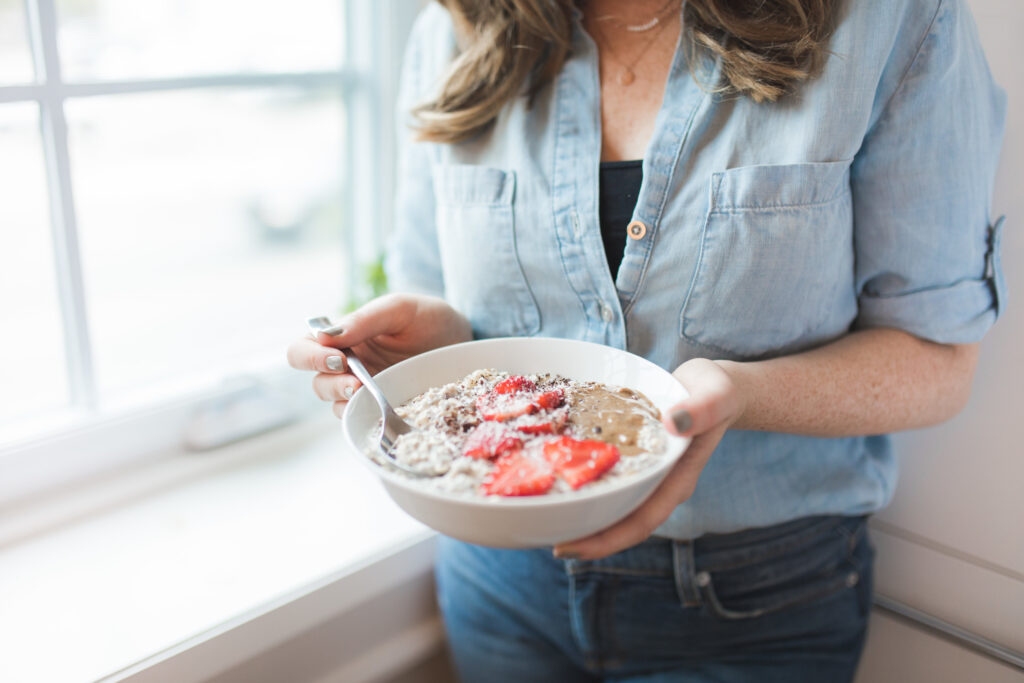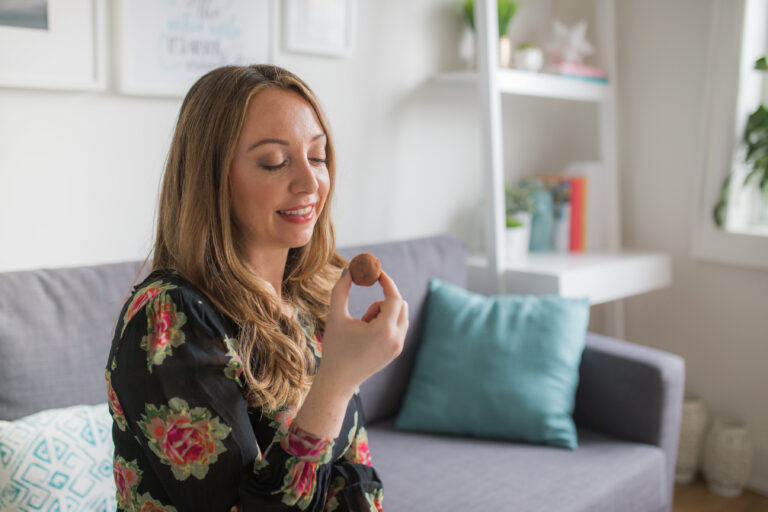How to Stop Emotional Eating & Why You’re Doing It

If there is one thing I know, it’s that our relationship to food can often be defined as “it’s complicated,” and so many are searching for how to stop emotional eating. Women especially have a hard time with food, dieting and our relationship to ourselves and how we treat ourselves. It shouldn’t be surprising though, we are bombarded by societal standards of what beauty is (and isn’t) on a daily basis and we are constantly receiving messages on what/how to eat via diet culture. For all of these reasons and so many more, we can often times eat emotionally.
I recently hosted a workshop with my nutrition bestie all about how to stop emotional eating with some amazing women. What I discovered after hosting this, listening and learning from them it’s that emotional eating can happen to anyone. There are lots of reasons emotional eating can happen, but today I am going to dive deeper into three reasons it happens and how to stop emotional eating.
How to Stop Emotional Eating: Three Reasons why it Happens:
1. You believe there are “good” and “bad” foods:
Diet culture is so pervasive in our society that most of the time, we don’t even hear it anymore. There are so many trendy/wellness related cleanses and detoxes that we don’t even see them as a diet anymore, they are simply a healthy lifestyle. When we subscribe to these types of beliefs, we tend to also start labeling foods as good or bad. We have a list of “bad” foods to stay away from (like sugar- especially white sugar- the devil, processed foods, white carbs/bread, gluten and dairy) just to name a few of the most popular. Then we have our good foods (such as superfoods, fruits- only low sugar ones, veggies, grains – only ones that don’t contain gluten and organic anything). When we are following a plan of some kind (re: diet), we are “so good” but as soon as the plan is over, it is GAME OVER. Does this sound familiar? If it does, then you are familiar with emotional eating because chances are when we restrict these bad foods for so long, we in turn start craving them more and more.
Bottom Line: When we learn to separate morality from food and our subsequent judgment, we don’t need to fear certain foods. They no longer have control over us and we are much less likely to eat emotionally because we fear we won’t ever get to eat these foods again. I would encourage you to listen to that voice inside your head that tells you a food is good or bad. Then question that statement by asking does this really hold true? If not, then learn to let that food rule go.
2. You are currently dieting or following a diet:
Much like what I alluded to above, if you are following a diet or even a “healthy lifestyle” type diet, you are more prone to restriction. What often will happen with restriction after so long is subsequent bingeing on certain foods that aren’t allowed on your program/diet/plan. Dieting is no fun, I don’t care what type of plan you are following. Most of the time, these programs just don’t allow for enough calories or food in their plans. Plus if you are also following an exercise plan and reducing your food intake, your energy will also plummet. When this happens, you are much more likely to become stressed out, anxious or moody and often times in states like that we tend to overeat or eat emotionally. That may be why after you have finished a plan or even if you haven’t you binge afterwards as a reward for your “good work.” Enter the subsequent feelings of guilt and shame and you have a recipe for emotional eating.
Bottom Line: When we learn to let go of dieting and diet culture and following rigid plans, we make room for a lot more in our lives. We don’t need to gorge on foods to reward ourselves or restrict others to follow a plan. We can just be. Enter intuitive eating!

3. You don’t allow yourself to enjoy food:
Why is that we associate rich, tasty food with words like sinful or deadly? Because for the most part, we associate pleasure from food as something that is best avoided (especially common in Western cultures). If it is too pleasurable, we won’t be able to stop, have the willpower to say no or control ourselves. But why do we need to have control around food in the first place? Why can’t we just enjoy food for what it is and not think anything else of it? Enter- DIET CULTURE! This is one of the reasons and that is something that we need to be aware of so that we can question and reject it.
Bottom Line: When we learn to look at food from both an aesthetic, pleasurable point of view, we learn to enjoy it as is, without needing to feel guilty for eating it. If you allow yourself to enjoy every bite of cake (or whatever else) without feeling shame or guilt, you will be much less likely to develop negative feelings about yourself and subsequently overeat or eat emotionally. The next time you find yourself feeling shameful or guilty from enjoying food, challenge that feeling. Question why you feel this way and dig a little bit deeper to find out what exactly is making you feel this way.

These three reasons for why you may be emotionally eating are just some of the reasons. I tend to think these are three of the biggest and also the hardest to overcome. None of these reasons are easily resolved or even identifiable some of the time because they require us to dig a little deeper and do the work. It’s not easy, but it is so worth it. I hope that this has helped to explain how to stop emotional eating and provides a starting point to start questioning food rules, diet culture and encourages you to challenge these thoughts.
I also want to offer a bit of guidance about emotional eating. It is nothing to be ashamed of, it happens to everyone! Also, sometimes, it is the best thing we can do to cope with things at the time and that is ok too. Learning to let go of your own judgments and bias you hold about yourself is also important.
Let me know in the comments if you currently find yourself struggling with emotional eating and what strategy you think can be most beneficial for you.






